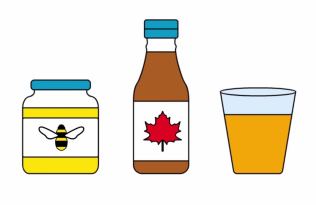
Watch: What are free sugars?
We all know we need to limit the sugar in our diet, but what exactly are 'free' sugars and how do we make sure we don't consume too many? Our animation explains all.

Excess weight or obesity can increase your risk of many diseases, including heart attack, stroke, type 2 diabetes, vascular dementia and some cancers.
In the UK, 64 per cent of adults and around 30 per cent of children have excess weight or obesity. These worrying statistics are behind our drive to address the obesity epidemic in the UK – one of the country’s biggest health challenges – through both research and changes to public policy.
The BHF has been working for decades to reduce levels of obesity and improve our health. Our focus has been changing public health policy, rather than individual behaviours. In 1993, we founded the Health Promotion Research group led by Professor Mike Rayner in Oxford, to look at ways to improve what and how much we eat at a population level as a means to reduce obesity and the associated risks of heart and circulatory disease. In 2013, this group started collaborating with the World Health Organization to support its global programmes to combat non-communicable diseases like obesity and heart and circulatory diseases.
In 2016, BHF-funded Associate Professor Peter Scarborough and colleagues, also from the Oxford team, calculated what effect reducing sugar intake could have on obesity levels in adults and children, and their risk of developing heart and circulatory disease. This work was included in the Public Health England review of options for reducing childhood sugar intake, and Professor Scarborough provided evidence at the Health Select Committee inquiry into childhood obesity.
This evidence contributed to the decision to announce the Soft Drinks Industry Levy, or ‘sugar tax’, in 2016. The levy came into effect in 2018 and added a tax to soft drinks that are high in sugar (but does not include juice or milk-based drinks).
Professor Scarborough and colleagues went on to study the effect of the tax and the increased awareness of the problem of sugary drinks. They found that before the tax came into effect in 2018, it helped reduce sugar content through incentivising reformulation of drinks by manufacturers. Between 2015 and 2018, there was a 30 per cent decrease in the volume of sugar from soft drinks sold per person in the UK. Consumers also changed their habits with sales of the most sugary soft drinks (those eligible to the tax) falling by 50 per cent, and sales of low- or zero-sugar soft drinks rising by 40 per cent.
Government health guidelines on sugar do not include sugars in milk, because we know very little about how they affect our health. We are funding Dr Javier Gonzalez at the University of Bath to study the effect of lactose (the sugar naturally found in milk) on levels of harmful fatty acids in the blood, which can raise the risk of heart disease. His project will provide important evidence for developing nutritional guidelines on sugars from milk. This could help us all to make healthier choices to reduce our risk of heart disease and stroke.
This work is even more relevant because milk drinks with added sugar aren’t currently covered by the sugar tax, because of the nutrients they contain. We already know that most of us are eating too much added sugar, but it’s not clear whether milk sugars could be adding to the problem. Finding this out will help policymakers to consider whether to include them in a “sugar tax” in future.
The launch of the Government’s new obesity strategy in July 2020 was a landmark step towards addressing obesity in the UK. It outlined bold policy measures such as restrictions on online and TV junk food advertising, and an end to buy-one-get-one-free promotions on unhealthy food.
We are now calling for these plans to be implemented swiftly, to make the healthy choice the easy option for everyone. This work is more urgent than ever, now that we know that having excess weight increases your risk of being seriously ill from Covid-19. Improving our unhealthy environment is necessary to address high levels of obesity in the UK.
First published 1st June 2021